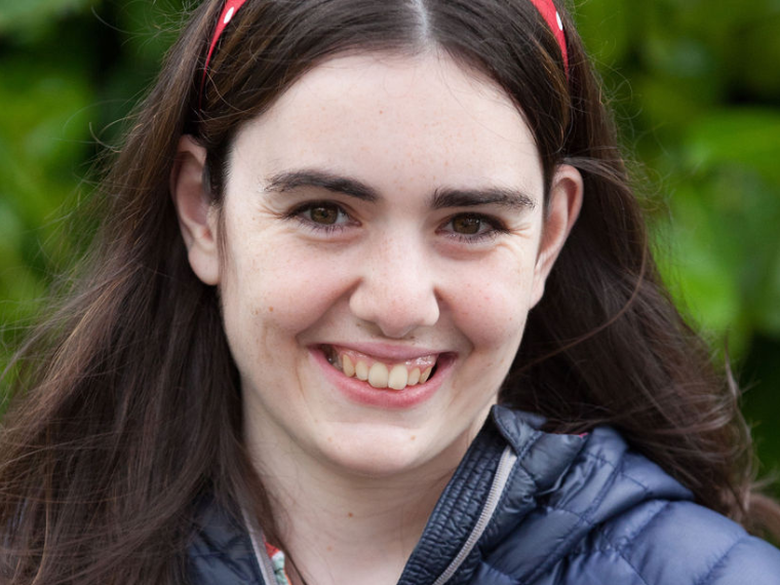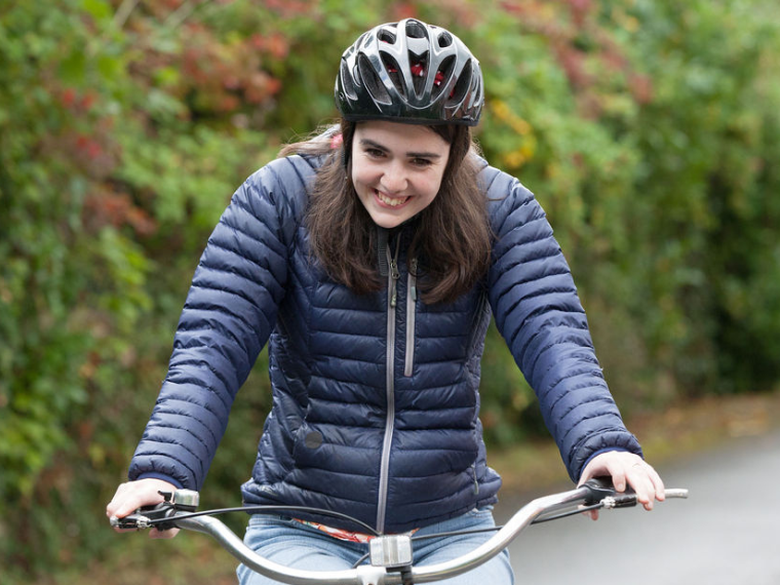7 images
Lucy
Lucy, now 22, lives in Supported Independent Living. Mum, Denise, shares their story.
Lucy had her first seizure after her first immunisations at 4 months old. As parents, we were panicked, but medical staff suggested we were being overly concerned – we were assured that 1 in 30 children had a febrile convulsion and that it probably wouldn’t happen again.
At 9 months old, Lucy had her second immunisations and what followed was a deep Status Epilepticus (a prolonged seizure lasting more than 5 minutes), a CAT scan, lumbar puncture and admittance to PICU. For the next four months, Lucy had at least one big tonic clonic seizure a week and several other seizure types throughout the day and night. During this time Lucy had been prescribed carbamazpine as a maintenance drug – we didn’t realise that this was a sodium channel blocker and it made the seizures worse.
Gaining a diagnosis
After a particularly huge seizure, when Lucy had a croup at 22 months old, she was once again admitted to intensive care. She was intubated for 2 weeks and it took her about 6 months to recover from this episode.
She continued to experience status episodes, resulting in admissions to ITU. We knew every ambulance crew in the area. We made the decision to move house to be closer to the hospital and never travelled further than a ten-minute radius of our home in Exeter unless we had a nurse or doctor with us.
Lucy was referred to Great Ormond Street under the care of Professor Helen Cross and after genetic testing, we were told that Lucy had the SCN1A gene mutation and she was diagnosed with Dravet Syndrome at 3 years old.
Growing up
Lucy went to a mainstream primary school until Year 6 and despite continuing to experience generalised tonic-clonic and complex-partial seizures, her 1:1 Teaching Assistant (who had previously been a nurse) supported both her medical and learning needs.
After this, she moved to a secondary school for pupils with ‘moderate learning difficulties.’ Lucy had access to speech and language therapy, occupational therapy and physiotherapy services. She also attended small groups for support with core stability, with maths and social skills. The school ensured that they were all trained to manage Lucy’s seizures and never allowed her medical needs to limit her opportunities. They risk assessed everything and never left anything to chance.
When it came to the end of secondary school, Lucy went to a local college, during which time she transitioned to adult services.
Funding for the next stage of Lucy’s life
It was important to understand the funding streams available to Lucy on her transition to adult services, to ensure that her education, health and care were supported in the best way possible. We naively thought that this would happen through the annual review process.
Researching what was available locally for Lucy wasn’t straightforward in any way and there was a huge ‘bun fight’ as to who was going to fund Lucy’s plan. We were encouraged by social care to request Continuing Healthcare Funding – a meeting was arranged and we were presented with the ‘Decision Support Tool for NHS Continuing Healthcare’.
The second section of this tool is organised into ‘Care Domains’ – behaviour, cognition, psychological & emotional needs, communication, mobility, nutrition, continence, skin, breathing, drug therapies & medication symptom control and altered states of consciousness. A sliding scale of funding is then awarded in categories according to need (i.e. ‘priority need’ = highest funding). The recommendations are also judged in terms of; nature of need, intensity of need, complexity of need, unpredictability of need.
Again, naively, we thought that this would be a ‘fait accompli’ as Lucy had such a huge amount of evidence detailing her very complex condition. However, the category covering epilepsy - ‘Altered States of Consciousness’ - does not include a ‘severe need’ category, so Lucy was deemed to have ‘high needs’ in this area, where clearly, she would have scored ‘severe need’ if it was available.

Lucy was awarded 15% CHC funding. The Clinical Commissioning Group (CCG) deemed that Lucy’s needs were not medical. In our opinion and in the opinion of the social workers, this was both ridiculous and soul destroying in equal measure.
A senior social worker was assigned, we appealed the process and were invited to the CCG panel meeting to re-visit Lucy’s needs. During the meeting we were challenged constantly about Lucy’s needs and told that she didn’t have significant health needs. This was a very harrowing experience for us as parents, who had been there for every seizure and sat at her bedside during all of her hospital stays. We both suffer from post-traumatic stress disorder and re-living the scenarios was very difficult indeed.

As a result of appealing the initial decision, Lucy was then awarded 40% CHC funding and 60% social care funding. Her EHC plan indicated this change in funding to enable her to attend a specialised independent college placement close to home. It offered a curriculum that was more suited to Lucy’s needs.
She threw herself into college life and absolutely loved the opportunities that she was offered. She continued to make progress at her pace and was now able to read and write at a functional level. The staff took Lucy’s seizures very seriously and followed the plan from her previous placements. They risk assessed everything and ensured that if and when Lucy had a seizure, they could keep her safe.
Supported Independent Living
The next stage was the scariest for us because Lucy wanted the same opportunities as other people her age; she wanted to move away from home into supported independent living.
We found a local charity called ‘Rainbow Living’ who buy houses for adults with additional needs to live in. A care team is then recruited to support the care of the young people. The process took about 12 months for the young people to be matched and the house secured. We had to apply for housing benefits alongside her other benefits.
Lucy’s care package ensures that she has 1:1 support 24 hours a day. There are 5 young people in the house, all with complex needs. There is always one carer on a sleeping night and one carer on a waking night as well as a team of carers for daytime activities. Her seizures continue to be unpredictable and always require emergency treatment.
A fulfilling life
Lucy’s education has now finished so we are in the process of organising a valid and interesting life for her to enjoy and we’re still very much involved in ensuring that life is running as smoothly as possible for her.
Her college has asked Lucy to return one day a week in a volunteering role. She will work as a learning support assessment in the morning and in the head office; working on basic admin jobs in the afternoon. She has a lanyard that she is very proud of! She is also volunteering with the National Trust at Kilerton House. We are incredibly grateful that Lucy has got these chances.
A sociable young adult
Lucy loves contact with others. Her friends from secondary school continue to be her best friends into adulthood, even though they have all moved on to different colleges and lives. She became very adept at ‘Zoom’ during lockdown and took every opportunity to meet up online with others. She even organised a Zoom 21st birthday disco!
Lucy said; “Hello, my name is Lucy. I am kind, polite, patient, caring and fun loving.
I like to go to the special needs discos with my friends. I love going to parties. I love climbing with my Mum. I love visiting family and friends with my Mum and Dad. I love doing various activities – like Art Makers where I get to do art projects with people that I’ve known for a long time. I also love to go out with my housemates and staff at my home where I live in supported independent living.
I know I have Dravet Syndrome and I hate my seizures but I try to live my best life and do as much as I can.”

